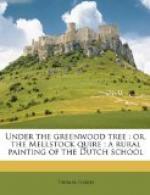“Ay!” said Bowman, shaking his head; and old William, on seeing him, did the same thing.
“More’s the pity,” replied another. “Time was—long and merry ago now!—when not one of the varmits was to be heard of; but it served some of the quires right. They should have stuck to strings as we did, and kept out clarinets, and done away with serpents. If you’d thrive in musical religion, stick to strings, says I.”
“Strings be safe soul-lifters, as far as that do go,” said Mr. Spinks.
“Yet there’s worse things than serpents,” said Mr. Penny. “Old things pass away, ’tis true; but a serpent was a good old note: a deep rich note was the serpent.”
“Clar’nets, however, be bad at all times,” said Michael Mail. “One Christmas—years agone now, years—I went the rounds wi’ the Weatherbury quire. ’Twas a hard frosty night, and the keys of all the clar’nets froze—ah, they did freeze!—so that ’twas like drawing a cork every time a key was opened; and the players o’ ’em had to go into a hedger-and-ditcher’s chimley-corner, and thaw their clar’nets every now and then. An icicle o’ spet hung down from the end of every man’s clar’net a span long; and as to fingers—well, there, if ye’ll believe me, we had no fingers at all, to our knowing.”
“I can well bring back to my mind,” said Mr. Penny, “what I said to poor Joseph Ryme (who took the treble part in Chalk-Newton Church for two-and-forty year) when they thought of having clar’nets there. ‘Joseph,’ I said, says I, ’depend upon’t, if so be you have them tooting clar’nets you’ll spoil the whole set-out. Clar’nets were not made for the service of the Lard; you can see it by looking at ’em,’ I said. And what came o’t? Why, souls, the parson set up a barrel-organ on his own account within two years o’ the time I spoke, and the old quire went to nothing.”
“As far as look is concerned,” said the tranter, “I don’t for my part see that a fiddle is much nearer heaven than a clar’net. ’Tis further off. There’s always a rakish, scampish twist about a fiddle’s looks that seems to say the Wicked One had a hand in making o’en; while angels be supposed to play clar’nets in heaven, or som’at like ’em, if ye may believe picters.”
“Robert Penny, you was in the right,” broke in the eldest Dewy. “They should ha’ stuck to strings. Your brass-man is a rafting dog—well and good; your reed-man is a dab at stirring ye—well and good; your drum-man is a rare bowel-shaker—good again. But I don’t care who hears me say it, nothing will spak to your heart wi’ the sweetness o’ the man of strings!”
“Strings for ever!” said little Jimmy.
“Strings alone would have held their ground against all the new comers in creation.” ("True, true!” said Bowman.) “But clarinets was death.” ("Death they was!” said Mr. Penny.) “And harmonions,” William continued in a louder voice, and getting excited by these signs of approval, “harmonions and barrel-organs” ("Ah!” and groans from Spinks) “be miserable—what shall I call ’em?—miserable—”




